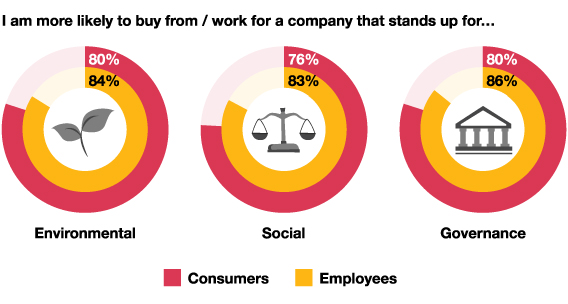ESG: three letters transforming the world

Since 2022, every company listed in the EU is required to report on their compliance with sustainability standards. In addition, as of 2024, companies will be required to include their alignment with ESG practices in their financial reports. But compliance with ESG principles has many other benefits beyond ticking legal boxes. Find out what it means and how to manage your company with these principles in mind.
What does ESG stand for?
ESG stands for Environmental, Social and Governance. These three concepts designate the standards that companies must follow to raise their commitment to sustainability.
The “Environmental” concept designates a set of behaviors of a socially conscious company towards the conservation of the natural world. Actions should be geared towards mitigating climate change and air and water pollution. It represents the adoption of energy and water efficient processes, carbon neutrality, and effective waste management.
On the “Social” side, companies can make a difference by adopting adequate data protection and privacy practices, respecting human rights, and fostering positive connections with employees, suppliers, and the general community. Finally, “Governance” requires companies to adhere to ethical behavior, observable in compliance with labor laws, compensation, audits, and anti-corruption rules.
What does ESG management mean?
ESG management seeks long-term, sustainable results. It involves practices and improvements to make companies more active as agents of social and environmental change – and there are already several good examples of these concepts in practice.
IKEA committed to reduce 80% of its carbon emissions by 2030. It is also focusing on creating furniture from renewable and recyclable materials. Moreover, this mission is not limited to internal operations: it also promotes awareness actions with its customers about the role of each one in building a more sustainable world.
Microsoft is also joining in. In 2020, it promised to achieve carbon neutrality by 2030, which is the equivalent of eliminating all the carbon dioxide released since its foundation in 1975. In addition, the publication of the report Racial Equity Initiative: Strengthening Our Communities was important to fight racial injustice and thus promote diversity and inclusion.
Why is ESG management important?
ESG management is increasingly important for the planet because of the consequences of climate change. On the one hand, it helps to ensure that companies are complying with environmental and social laws in an ethical and transparent way. On the other, it contributes to fair pay and safe and healthy working conditions that have a real impact on people’s lives. For companies, ESG practices are a stepping stone to become more competitive and resilient in the long haul, as well as to generate better notoriety with customers and employees.
ESG practices have been shown to bring important added value to companies, with an impact on market value. According to a study by S&P Global, products and services that follow sustainable practices accounted for about 50% of growth in world’s largest companies. In addition, data published by PwC reveals that most consumers will be more loyal to a brand that supports environmental or social causes.

Source: PwC
Therefore, adopting ESG practices is an opportunity for all companies to improve their results and gain the trust of consumers.
How to manage your company with ESG principles?
All companies can implement measures to align their management based on ESG principles.
1. Environmental: Reduce your company’s environmental footprint
To reduce your impact on the environment and increase your contribution to environmental conservation and sustainability, follow these tips:
- Choose energy-efficient equipment.
- Use clean, renewable energy, such as wind and solar.
- Develop recyclable packaging, or packaging that uses less plastic.
- Make conscious and responsible use of water and electricity.
- Implement internal and external awareness campaigns to save natural resources.
- Ensure proper waste and effluent management.
2. Social: promote equal opportunities and give back to society
Companies are encouraged to develop an attractive corporate culture that can retain talent, maintain low turnover, and thus ensure growth. The main actions are:
- Assess the level of customer satisfaction.
- Ensure data security and privacy.
- Ensure diversity, inclusion, and gender equality in your teams.
- Carry out social projects and promote involvement in the local community.
- Respect human rights and labor laws.
- Ensure fair working conditions.
3. Governance: make transparent and prudent investment decisions
Companies that focus on responsible and ethical management attract investors, customers, and partners. Some of the key aspects to consider are:
- Manage investments prudently to diversify and mitigate risk to the business.
- Ensure adequate remuneration and rights for staff, partners and shareholders.
- Implement structural anti-corruption measures, such as setting up a whistleblower channel.
- Provide access to complete and transparent reports and accounts.
Somengil, supporting ESG practices
Washing is one of the operations in every company that consumes the most water, detergent, energy, and time. Therefore, it is essential to have equipment that optimizes the use of these resources, without affecting the quality of the wash. The MultiWasher is a state-of-the-art industrial washing machine that cleans any type of utensil impeccably. It uses 2/3 less water than other solutions on the market, consumes 70% less detergent, and can shorten the washing time by avoiding the pre-wash, because the utensils come out of the machine dry and ready to use. You can see it in action and see for yourself the impact that this technology will have on your company’s sustainability.



